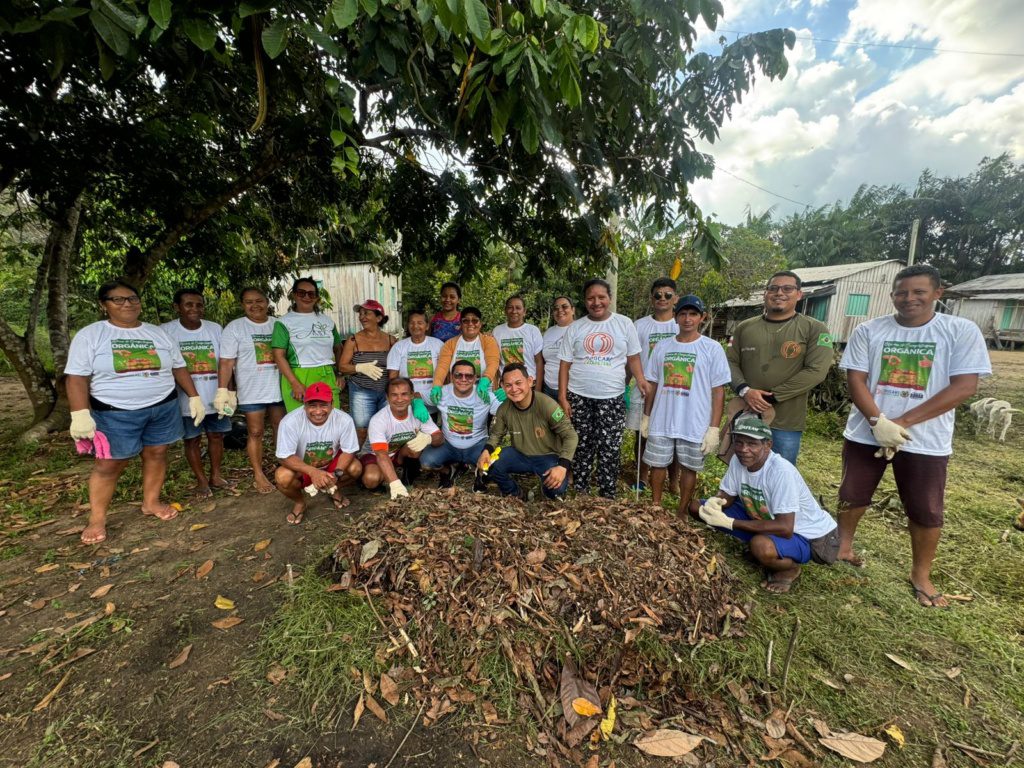Sustainable Composting Workshop with the Rural Women’s Association
Composting for Conservation: Building Healthier Soils and Stronger Forests
On April 22, 2025, the Trocano Araretama Project team, alongside Borba Municipal Hall and the Rural Women’s Association, made an important journey to the community of Vila da Paz to deliver something truly valuable: a sustainable composting workshop designed to empower local residents and promote sustainable living. This initiative aligns with Go Balance’s commitment to promoting environmental sustainability and community resilience within the Trocano Project.
Even though the road to get there was rough — filled with potholes, flooding, and even an overflowing stream — our Trocano Project team was determined. And when they finally arrived, the warm smiles and heartfelt welcome from the residents made every challenge worth it.
Community Engagement and Education
We were greeted by Mrs. Cleidiane Colares, president of the Associação Mulheres do Campo (Rural Women’s Association), who led us to the simple but lively meeting space. Despite limited infrastructure — a roof made from Brasilit tiles and makeshift wooden seats — the energy and enthusiasm of the community filled the air.
Mrs. Cleidiane officially opened the event, thanking everyone for coming and introducing our Trocano Araretama team. Then, Trocano Project team members Raidê Ferreira Carvalho and Gilmara Menezes shared a little about themselves and the mission of the Trocano Araretama Project: protecting the environment while helping rural communities gain knowledge and tools for a better, more sustainable life.
Composting fits this mission perfectly. It turns everyday organic waste into rich, natural fertilizer — improving soil health, reducing pollution, and even creating opportunities for extra income. Community initiatives such as these are at the heart of what it means to be a REDD+ project developer.
Learning the Art and Science of Composting in Trocano
We started the day with a theory session, covering:
- What sustainable composting is and why it’s important
- Which materials can (and cannot) be used
- How to build a proper composting pile
- How to manage and care for the compost over time
The community’s participation was incredible. Many residents shared their traditional practices and asked thoughtful questions. It was clear that they were eager to learn and excited to put their new knowledge into action.
We especially focused on practical tips, like how to balance green (wet) and brown (dry) materials, keep the compost moist (but not soaked), and allow plenty of air circulation to speed up the process.
Hands-On Practice: Sustainable Composting in action
After a delicious, shared lunch, we moved to the practical part of the workshop. We handed out gloves, shovels, forks, and carts, and together we prepared the area for the composting pile.
Everyone got involved — clearing the ground, gathering materials, and carefully layering the greens and browns. Step by step, we built the pile, making sure everyone understood why each step mattered. The energy was high, and the teamwork was fantastic!
By the end of the afternoon, we had not only created a healthy compost pile but also strengthened the community’s skills and confidence to continue composting at home and around the community.
Impact on Community Resilience and Environmental Sustainability
At the end of the day, we gathered for final questions, reflections, and lots of smiles. The residents expressed deep gratitude for the workshop — many said it was the first time they had received this kind of training in their community.
This workshop wasn’t just about waste management — it was about planting seeds of knowledge that will keep growing for years to come, supporting local farming, boosting food security, and strengthening environmental stewardship.
We left Vila da Paz with full hearts, inspired by the resilience, warmth, and eagerness of this amazing community. We are proud to have shared this moment and excited to see the positive impact it will create.
REDD+ From the Ground Up: Healthy Soils, Safer Forests
By building skills in sustainable composting, we’re not just improving local farming practices — we’re strengthening the foundations of forest protection. Healthier soils mean stronger crops and less need to clear new land, which is critical for achieving the Trocano Project’s REDD+ objectives. Every compost pile built is a step toward long-term forest conservation, supporting both the environment and the well-being of the communities who call the Amazon home.

The Trocano Araretama Project team, together with the Rural Women’s Association in Borba
For more information on our initiatives and to explore how the Go Balance REDD+ projects are making a tangible difference, please visit our Go Balance Projects Page.